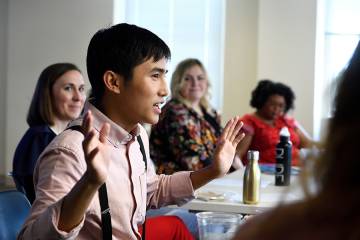The office of student research at the Krieger School has a new name and new research opportunities.
Now called the Office of Undergraduate Research, Scholarly and Creative Activity, or URSCA, the office continues to be directed by Natalie Strobach and will continue to support Krieger School undergraduate students interested in or currently pursuing research in the humanities, social sciences, and natural sciences.
URSCA manages a variety of research funding opportunities, including the Woodrow Wilson Fellowship, the Dean's ASPIRE Grant (formerly called the Dean's Undergraduate Research Award), the Bander Family Fund, the Clinger Award, the Albstein Research Scholarship, and the Amgen Scholars Program. The office also oversees several summer programs for visiting students.

Image caption: Natalie Strobach
This spring, URSCA launched its new Humanities Research Clusters, which offer students the opportunity for and provide funding for student-led conversations about big ideas. Since the most exciting topics in the humanities don't always fit neatly into one academic department or discipline, URSCA created the clusters to encourage open discussions of current topics in evolving and understudied interdisciplinary fields.
"As a humanities scholar myself, some of my most engaging conversations have been discussing topics with friends and colleagues from a broad range of disciplines," Strobach said. "Given the immense creativity of our students, I'm sure the clusters will produce dynamic hybrid discussions that speak to the future of the humanities and further embed them in the rich history of the humanities at Hopkins."
Students interested in starting a cluster should focus on a topic that is close to their own field of study but that can be approached within (and outside) many different fields of the humanities. For example, a cluster focused on "food culture" might include scholarship from sociology, political science, public health, film and media, literature, and elsewhere.
"This is, in many ways, a mode of engagement our students are already active in; we think in constellations," Strobach added. "But now, with the generous funding provided by the Krieger School's Dean's Office, we are able to support our students in expanding their reach by allowing them to form thought clusters that extend across campus as they design their educational experience. This is a way to constructively talk to other people about what you love."
Each cluster will receive up to $1,000 of annual funding from the university for meetings, materials, and guest speakers, and members will have access to the Humanities Collaboratory, a new flexible hybrid learning space on campus. The clusters are open to undergraduates and graduate students.
Applications will be accepted through July 15.
Posted in University News, Student Life
Tagged undergraduate research, humanities








